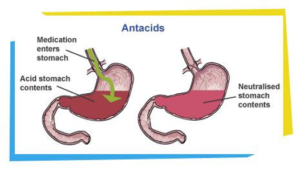
Some things go hand and hand, like hot dogs and baseball, unfortunately a lot of picnic food and heartburn or acid reflux do too!
Why does this happen?
When we eat, the stomach releases acid to help digest food. It’s not uncommon that sometimes, especially during the holiday, overeating can cause the stomach to release more acid than usual. Occasional heartburn, a burning/discomfort feeling in the lower chest, is a result of excess acid flowing back into your esophagus. Other symptoms may include bloating, dry cough, burping, and upset stomach. All of those symptoms from excess stomach acid can be relieved by over-the-counter medications and lifestyle changes.
What can I do to prevent or treat this?
There are many over-the-counter options. There are acid-reducing products such as a proton pump inhibitors (omeprazole, pantoprazole, esomeprazole) and H2 receptor blockers (famotidine, cimetidine, ranitidine). These are mainly used for chronic heartburn and do not provide immediate relief. For the purpose of this article, we will focus on antacids, which are used to quickly and temporarily relieve any discomfort from excess (overproduction) stomach acid.
How do they work?
Antacids contain something that interacts with the acid in your stomach, such as sodium bicarbonate, aluminum hydroxide, calcium carbonate, and magnesium hydroxide.
They work by counteracting (neutralizing) the acid in your stomach, which help reduce effects caused by high amounts of acid from the stomach.

While OTC antacids can help temporarily relieve your symptoms, they can’t treat the real medical conditions you might have. It’s important that you contact your healthcare provider if you have any of the following:
● Severe stomach upset or pain
● Pain when swallowing
● Coughing up any blood
● Bloody or black stools
● Intolerant/frequent heartburn that interferes with daily activities
● Heartburn that just does not go away
Remember: To have the best result, any medication treatment should always be accompanied by diet and lifestyle changes. Below are things that you can do to help prevent extra stomach acid if you experience symptoms regularly.
Foods to avoid Practice good habits
● Alcohol
● Chocolate
● Coffee, soda
● Peppermint
● Spicy foods
● Garlic, onions
● Quit smoking
● Avoid tight-fitting clothes
● Avoid eating 2-3 hours before sleep
● Eat small meals throughout the day instead of big ones
● Sit upright or do short walks after meals (don’t lay down right away)
● Weight loss if you are overweight or gaining weight recently
● Raising the head of bed (6-8 inches) if you experience heartburn at night: using wedge pillow/adjustable bed frame.
If you are thinking about weight loss, we have an amazing program at Bremo Pharmacy. Check out this link to find out more https://bremorx.com/ideal-protein-losing-weight-made-simple/
What OTC choices do I have?
You will find that there are so many antacid options over-the-counter (OTC). Don’t be overwhelmed. They all work the same as to balance (neutralize) the acid in the stomach. The main difference between them is the active ingredient in each. These active ingredients are different in how fast and how long they relieve your symptoms. In general, antacids start working within 5 minutes and provide short, temporary symptom relief for approximately 20-30 minutes. It’s best to take antacids within 1 hour after eating or as soon as you have heartburn.
Available over-the-counter antacids includes:
Sodium Bicarbonate (Alka-Seltzer®, Zegerid®): Sodium bicarbonate works very fast but only provides symptom relief for a short period of time, generally 20-30 minutes. These contain sodium, using too much can increase your blood sodium level. People with high blood pressure or kidney disease should discuss with your healthcare provider before taking any sodium containing products.
Calcium Carbonate (Tums®, Rolaids®): Calcium carbonate works quickly and provides longer symptom relief than sodium bicarbonate. These products contain calcium, using too much of it can increase your blood calcium level. Higher calcium level than normal limits for a long period of time can cause kidney stones, weak bones, and other complications.
Magnesium Hydroxide (Phillips’ Milk of Magnesia®): Magnesium hydroxide works fast and provides moderate symptoms relief. Magnesium containing antacids can cause diarrhea and in kidney disease, can increase magnesium level. Discuss with your healthcare provider first before using.
Aluminum Hydroxide (Amphojel®, Basaljel®): Aluminum hydroxide takes longer to work but then they provide longer symptom relief. These products tend to cause constipation and lower your phosphate level with extended use.
Magnesium and Aluminum combined products (Maalox®, Mylanta®, Gaviscon®): These products provide fast and longer symptom relief. Side effects include both diarrhea from magnesium and constipation from aluminum. Discuss with your healthcare provider first before using this product if you have any kidney problems.
It’s always important that you read the directions on the package label very carefully to make sure what is in it and how to take it. Before using any OTC products check out our previous post on how to safely use OTC products: https://bremorx.com/use-counter-medications-safely/
All OTC products are intended for short-term use only. If you have any question, concern, or want a recommendation ask our pharmacists here at Bremo Pharmacy!
By: Mai Ngo, PharmD candidate 2020
References:
https://www.healthline.com/health/antacids#when-to-call-a-doctor
https://medlineplus.gov/ency/patientinstructions/000198.htm


